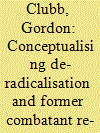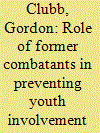| Srl | Item |
| 1 |
ID:
163700


|
|
|
|
|
| Summary/Abstract |
Nigeria has recently joined the many states which have established de-radicalisation programmes. The article engages with debates on how the success of de-radicalisation can be ascertained given the substantial flaws of using individual-oriented recidivism rates as a measure. Many studies on de-radicalisation emphasise the need to consider the programme’s context to facilitate success, yet ‘context’ has been under-conceptualised and approached statically. The paper provides greater agency to ‘the context’ in distinguishing between the type of milieus former combatants are re-integrated into and how these emergent social relations shape the scope of de-radicalisation programmes, beyond the traditional over-emphasis on programme participant outcomes as measures of success. The Nigerian de-radicalisation programme has a broader function insofar as it provides former combatants with ‘scripts’ of disengagement and function as a brand, signalling to communities that former combatants have repented and are ‘better citizens, imbued with genuine nationalism’ that resonate with local communities.
|
|
|
|
|
|
|
|
|
|
|
|
|
|
|
|
| 2 |
ID:
134443


|
|
|
|
|
| Summary/Abstract |
Utilizing interviews with former Irish Republican Army (IRA) members, Loyalists, and community workers, the article looks at how militants in Northern Ireland have helped to prevent terrorism and political violence (TPV) by adopting roles in the community. By using mobile phones, a network of former combatants emerged around interface areas in the late 1990s to contain trigger causes of terrorism, providing a unique role that the state could not. The structure of the network encouraged militant groups to follow the IRA's example to disengage—thus creating a domino effect—and the co-operation between senior militants has limited the opportunities for other groups to mobilize a campaign of terrorism.
|
|
|
|
|
|
|
|
|
|
|
|
|
|
|
|
| 3 |
ID:
145823


|
|
|
|
|
| Summary/Abstract |
The article engages with emerging debates on the potential role returning Islamic State fighters may have in preventing violence and whether nonviolent radical ideology acts as a conveyor-belt or firewall to violence. Rather than focusing on former combatant ideologies, it demonstrates how framing processes—not ideology per se—are more salient indicators of whether former combatants will act as conveyor-belts or firewalls to violence. The analytical framework developed for analyzing framing processes is then applied to the case of Northern Ireland. It argues that ideology shapes and constrains the type of antiviolence framing that may emerge, which provides a middle ground between the two perspectives in the literature. Furthermore, the article highlights the importance of network structures, incentives, and opportunities insofar as these can shape antiviolence framing and improve resonance among audiences. While recognizing the differences between cases, the framework is then used to argue that former Islamic State combatants can play a preventative role depending on whether their antiviolence framing is based on durable structural conditions, de-glamorizes violence, and is supported by networks that incentivize its diffusion—not on whether they have denounced their ideology.
|
|
|
|
|
|
|
|
|
|
|
|
|
|
|
|
| 4 |
ID:
146227


|
|
|
|
|
| Summary/Abstract |
Experiences from the end of the Provisional Irish Republican Army’s campaign of armed violence have informed broader debates on how terrorism ends, yet this research has underplayed the internal dynamics which made the IRA’s disengagement successful. The article utilises a framing approach to explain how a network within the IRA managed to ensure the majority of the movement supported an end to violence. A disengagement frame was constructed by this network within the IRA which maintained narrative fidelity, it utilised the credibility of mid-ranking commanders, and there were sufficient linkages to diffuse the frame due to generational hegemony, the structure of the IRA, and the unique structure of the prisons system. Finally, the article challenges the utility of decapitation strategies because organisational stability can maintain the components which ensure a disengagement frame will resonate.
|
|
|
|
|
|
|
|
|
|
|
|
|
|
|
|